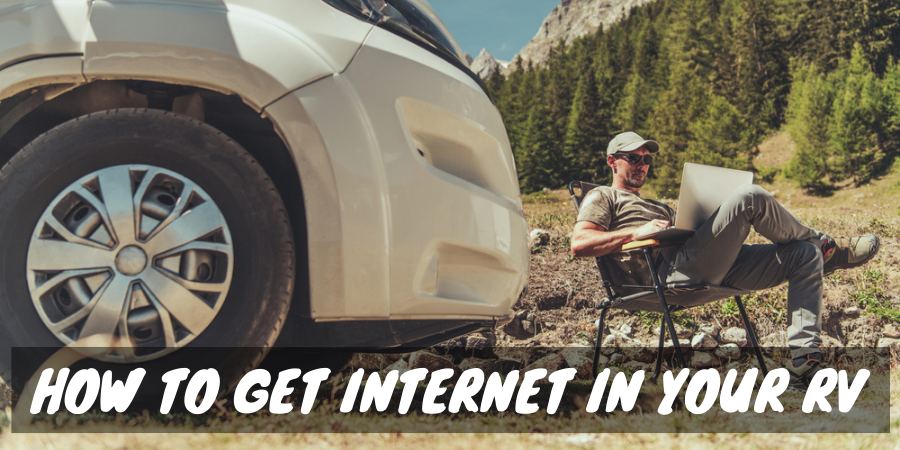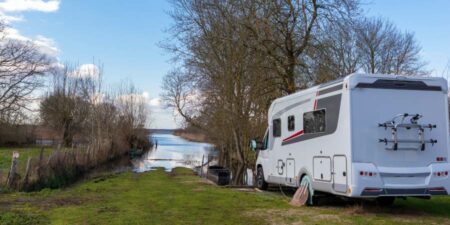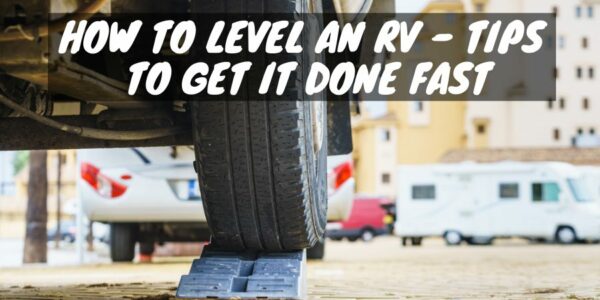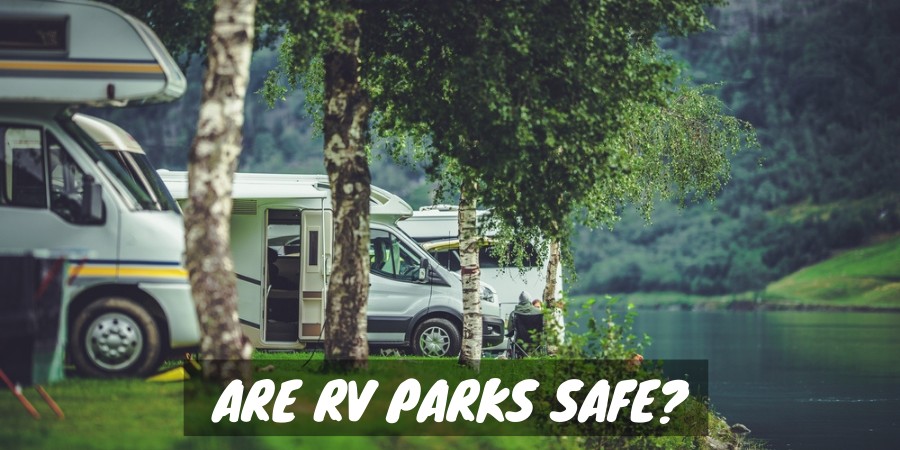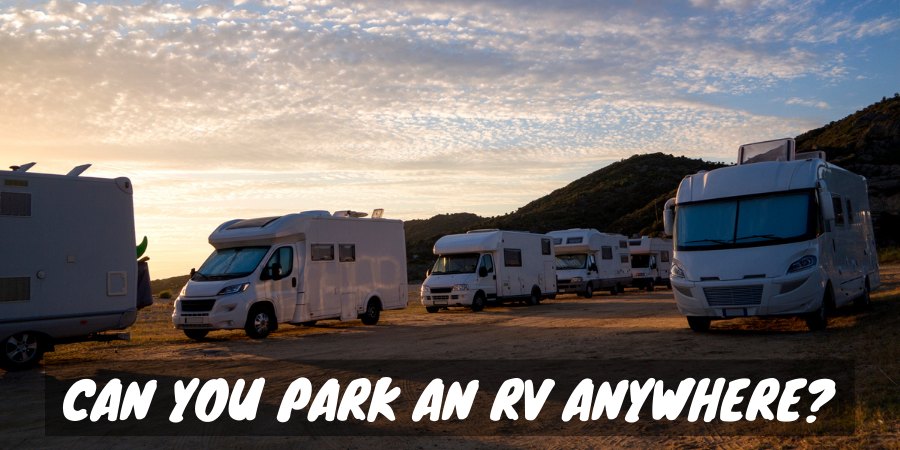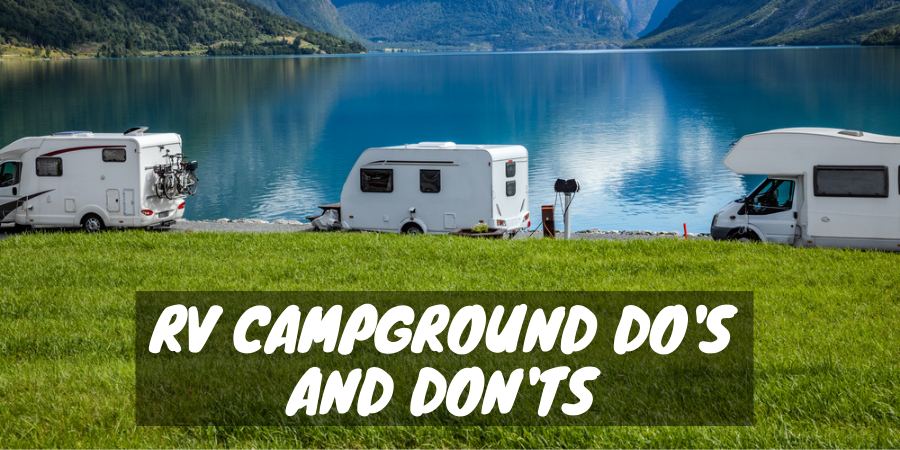The internet is a must-have in current RV travel. From remote working to keeping up with the weather, social media, sports, or your favorite shows, being able to connect is crucial for both parents and children alike.
While campgrounds try to appease guests by offering free Wi-Fi, there are plenty of reasons to understand what to really expect when it comes to RV internet access, so you aren’t left hanging when you need internet the most.
The Reality of RV Internet

When it comes to the internet while on the road in an RV, you need to realize the number one rule: you are on your own.
Never rely on campground claims of “super-fast wireless internet” or that local stores or shops that offer free Wi-Fi will be open or be as fast as you need.
Don’t assume you will always have cellphone service to fill in gaps when you need to use the mobile hotspot in a pinch.
The answer is to own a combination of personal internet system options that offer enough data to allow everyone in your RV to have the internet access and speed they require to keep up with daily tasks.
When you cover personal internet needs during RV travel, any bonus “free” internet you encounter is a treat. When you have to rely on free internet at campgrounds, you will inevitably be sorely disappointed.
Let me break down all you need to know about RV internet access, including the tricks RVers with experience use so you can work or play online without fail.
Personal Hotspots
Many RVers find that having a personal hotspot with nationwide coverage works best. No matter what campground you stay in, hooking up to your own Mi-Fi, like a Verizon JetPack, is exceptionally reliable.
The issue is that carriers like Verizon or Sprint charge upwards of $200 a month for enough gigs and speed to keep up with one or two people’s internet browsing needs. The price can be limiting for RVers on a budget.
For RVers who require ample daily internet access at high speeds, owning and paying for two different carrier hotspots is common as well as costly. Some areas may have better Sprint or AT&T coverage, while others may work best with Verizon.
If one carrier’s Mi-Fi isn’t working up to par, you can use the other one.
What about unlimited Mi-Fi plans? These are a hot topic among full-time RVers as they can save lots of money.
My personal experience with a Mi-Fi was buying one of these “grandfathered” unlimited plans sold on eBay. I believe the hotspot was flashed from an older Verizon phone, as I had to submit my $7 monthly payment to a specific phone number associated with the purchase.
While I understand the whole transaction was a bit suspect, the $99 cost of the hotspot, plus the monthly charge, was so low it offset any qualms I had about how well the internet would work.
What I found out was that the service was fantastic! The two of us in the RV could hook up to the internet with NO data limit and enjoy high speeds with no issues as long as we were within a strong Verizon signal, which is just about anywhere.
The joy (and jealousy of other campers) lasted for just over two years when, one day, it quit working. I learned that periodically, Verizon goes through older numbers and purges them to eliminate lost profits from grandfathered numbers.
I figured we saved thousands of dollars on internet charges, so I wasn’t too upset we lost our service.
We did reinvest in another Mi-Fi and pre-paid for a few months of service, but the service again cut off within five months. At this point, we didn’t feel the financial hit was worth the risk, so we started to look at other options.
Be aware that companies are wise to misuse grandfathered unlimited internet data plans and are cracking down quicker on these sellers, so buy at your own risk.
Campground Internet

The campground we were staying in when our Mi-Fi died had free Wi-Fi for guests, who were mainly winter snowbirds. Our location within the park was good, as we were very close to an internet antenna tower.
After some trial, error, and annoyance, we found that if we went online after 9 PM, we had plenty of speed, but the time before that was too slow to bother.
Getting free internet access did work for a bit, but sometimes emails or other critical needs made it clear we needed to pursue a more convenient and reliable solution so we didn’t have to limit our internet time to late nights.
TIPS: Most campground offices have the best internet signal, so the closer you can park your RV, the stronger your signal will be.
Many campground offices also have a separate internet line from the guests, so it’s more reliable for making reservations or running payments.
Kiss up to an office worker (shhh, you didn’t hear this from me), and they may disclose the password so you can enjoy fast internet at no cost while other campground guests fight over bandwidth with the other hundred guests trying to stream Netflix every evening.
Another suggestion is to ask a worker to reset the signal, which is a quick process that can boost signal strength if your free campground Wi-Fi is slow.
Camping off-season is another option to ensure a better internet signal within a park, as there are fewer guests.
Remember that a campground pays a premium to offer a set “free” internet bandwidth and speed but can’t control how many of their guests access the internet at any one time.
So, while campgrounds state they have Wi-Fi in the park to attract guests, more likely than not, will it ever be fast enough for you to work or for your kids to spend an evening gaming?
Your RV build matters
Many newbie RVers fail to understand that the biggest strike against campground internet reception isn’t always the park’s system but your RV.
If you’re RV is mainly fiberglass and wood, you will have better luck with the internet. If your RV has aluminum or steel framing, roof, and siding, the signal can’t penetrate as easily or at all.
In this scenario, an internet signal booster may be all you need.
Wi-Fi Boosters
Wi-Fi boosters, like WeBoost, are devices you place inside your RV with an antenna you run either outside your RV or to a window. The device amplifies weak signals, familiar in a campground with only one or two towers.
As long as there is an internet signal, these units can provide an extra bar or two, which should be enough to check emails or pay some bills.
Granted, many camping locations are far from any free Wi-Fi signal, but boosters also work if you park the RV at stores or businesses like hotels that offer free access. Parking in a McDonald’s or supermarket lot while on the road between camping sites can do the trick if you need the internet and have no other option.
Want to Connect With a Community of Over 1,078 RV Enthusiasts?
If internet access is a top priority, consider newer RV models, like those from Keystone, that integrate Wi-Fi booster or access systems into the build, making it easier to work online anywhere.
Mobile Internet Access
Internet connectivity through your mobile phone is quick and easy to use but gobbles up data fast.
Using your cell phone as a hotspot is best for short tasks unless you have a low-cost monthly data plan.
Luckily, data price bundles are becoming less expensive, say around $30 for an extra 15GB, and many devices can connect to a single hotspot, which is ideal for family RV trips.
Phone carriers are also beginning to add in perks, such as T-Mobile’s Binge On, which lets users stream video and music without drawing down data. Ask about the latest offerings from different carriers. You may find a pleasant surprise.
Good cellphone coverage is crucial for using mobile hotspots, so keep these stats in mind:
- Verizon has the most coverage and reliable service across the country
- AT&T comes in second for coverage areas, but speeds are less impressive than other carriers
- Sprint coverage is best near cities or along highways
- T-Mobile provides fast speeds, but coverage is limited, so check coverage maps
The biggest issue with using your mobile phone for internet access is that most carriers put restrictions on actual usage in the fine print. Many throttle service after you exceed a certain limit, which can be super frustrating when you’re trying to complete work.
Just like with a dedicated Mi-Fi hotspot, many RVers who travel cross-country have two or more phones with different carriers to fill in any coverage gaps.
Satellite RV Internet
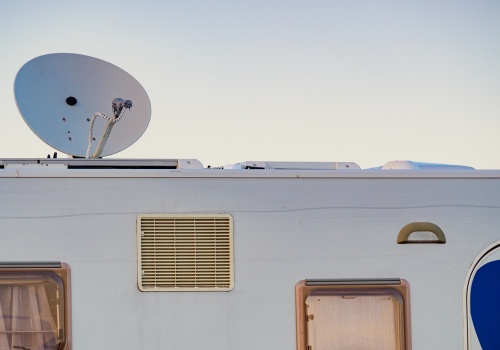
Satellite internet is a popular choice for younger RVers who appreciate the ability to camp off-grid but stay connected.
Many RV models offer a rooftop satellite for both television and the internet as an upgrade (or a perk to make a sale), which reduces the initial $1,200 average set-up cost.
You will still have to pay a monthly fee of around $10 per gigabyte of data to keep the service running, and some carriers require specific hardware, which is an additional cost.
Most providers package internet, VoIP service, and TV service in a bundle for a lower cost. The main providers for satellite internet are:
- DIRECTV
- HughesNet (Direcway)
- DISH
- Wildblue
- Viasat
- Skyway
Which company you choose depends on which regions you use your RV the most and which satellites deliver the strongest signals.
There is also a new satellite kid on the block, Elon Musk’s Starlink. The new low-orbit satellite isn’t quite ready for widespread use, but RVers should keep an eye on the brand as the equipment and monthly service plans are much more affordable than other options.
There are cons to satellite internet. The overall cost is high, and trees or inclement weather can impede the signal, making it run slowly or not at all.
Final Thoughts
RV internet access isn’t as difficult as it initially seems, nor does it need to cost you a fortune. Knowing where you plan to travel and how much data and speed you require for daily living is the first step to finding the perfect RV internet solution.
Once you create a system and have a backup plan in place, you can stay connected in your RV just about anywhere. The best news is that new technology brings better, faster, and cheaper RV internet options every day!
The Best RV Internet Set Up (Video)
"Man cannot discover new oceans unless he has the courage to lose sight of the shore."
-- Andre Gide

